US Strengthening Presence in Persian Gulf After Iran Threats

The United States will begin to bolster defensive posture in the Middle East region, White House spokesman John Kirby said on Friday.

The United States will begin to bolster defensive posture in the Middle East region, White House spokesman John Kirby said on Friday.
The US made the move after destabilizing actions by the Islamic Republic this past month to interfere with and seize commercial vessels transiting the Strait of Hormuz and other strategic waterways.
“[The] United States will not allow foreign or regional powers to jeopardize freedom of navigation through the Middle East waterways, including the Strait of Hormuz,” National Security Council Coordinator for Strategic Communications John Kirby told reporters on Friday, adding that there is “simply no justification” for Iranian actions to interfere, harass or attack merchant ships.
“Today, the Department of Defense will be making a series of moves to bolster our defensive posture in the Persian Gulf. US central command will provide additional details on those reinforcements in coming days,” he continued.
The US 5th fleet will increase the rotation of ships and aircraft patrolling the Strait of Hormuz and further increase security collaboration with partners and allies, according to a US Navy statement.
“Iran’s unwarranted, irresponsible and unlawful seizure and harassment of merchant vessels must stop,” Vice Admiral Brad Cooper, who oversees US Naval forces in the region, said in the statement, adding the US is “committed to protecting navigational rights in these critical waters.”
In April, the US Navy’s Bahrain-based 5th Fleet accused Iran's IRGC of making "dangerous and harassing approaches" toward US warships in the Persian Gulf.
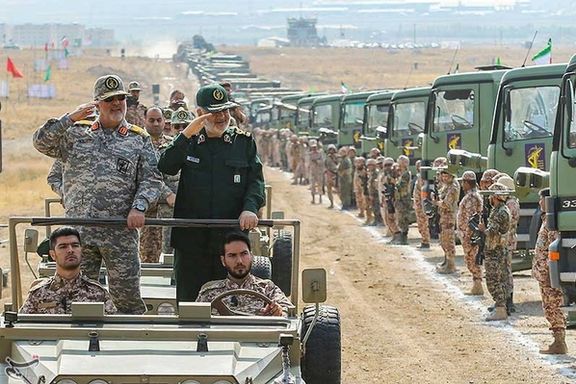
A bipartisan group of US congresspeople have urged Washington’s allies to designate Iran’s Revolutionary Guards as a terror group.
In letters addressed to the heads of the US-allied nations - the UK, Australia, Canada, and India - 22 Republican and Democratic lawmakers reiterated calls to swiftly act and officially join Washington in labeling the IRGC in its entirety.
“The Islamic Republic of Iran is the world’s leading state sponsor of terrorism and the IRGC is the central core of the country’s terrorist operations at home and abroad,” the lawmakers wrote Thursday, adding that “the IRGC has openly carried out plots targeting citizens around the world for decades.”
Rep. Claudia Tenney (R-NY) and Rep. Brad Schneider (D-Ill) led the effort in cooperation with Joe Wilson (R-SC), Brad Sherman (D-Calif), Pat Fallon (R-Texas), Adam Schiff (D-Calif) and 16 others.
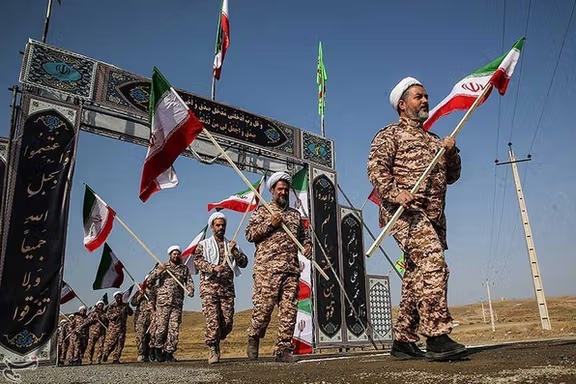
They argued that designating the IRGC will send a clear message to Iran that acts of terrorism against the US and its partners as well as innocent citizens “must not and will not be tolerated.”
“Now the United States Congress is calling on the United Kingdom, Australia, India, and Canada to join our fight in combating this organization’s cruelty,” Tenney said in a statement. “It is time that all nations designate the IRGC as a terrorist organization to send an unequivocal message that its terrorist activities must end.”
In each letter, the signatories elaborated on individual events that proved the IRGC is acting against the citizens of the four countries.
Canada has designated the Quds Force, the extraterritorial arm of the IRGC, but has been reluctant to list the IRGC as a foreign terrorist group. Canadian officials said last year that the designation would be too much of a “blunt instrument” that could punish innocent people in Canada who were conscripted into the IRGC as part of their mandatory military service.
The Australian Senate recommended the designation in February, but Canberra has suggested it may not legally be able to designate the IRGC as a terror group.
The UK has yet to make a formal decision, but it has been vacillating between the idea of proscribing the IRGC in its entirety and sanctioning only the senior members of the force for at least several months, especially after September when nationwide anti-regime protests engulfed the country. The IRGC, along with its paramilitary Basij volunteers, has been the main force to crack down on the popular uprising.
India is a close ally of the US, but it has long maintained cordial relations with Iran, and it is not expected to follow suit and blacklist the outfit.
The US is also ramping up its pressure on the European Union for the designation. In March, a bipartisan group of US senators wrote a letter to the High Representative for Foreign Affairs and Security Policy, Josep Borrell, encouraging the EU to designate the Islamic Revolutionary Guard Corps as a foreign terrorist organization.
Earlier in the week, the Swedish parliament unanimously voted to designate the IRGC. It swiftly followed the execution of Swedish-Iranian Habib Chaab (Asyud) which saw Sweden's Ministry of Foreign Affairs summon Iran's chargé d'affaires in protest of the execution, one of hundreds since the start of the year.
Earlier in the day, an Iranian lawmaker said Britain and France do not dare to designate the IRGC as a terrorist group because they know their forces in the region will be attacked if they do so.
Washington designated the IRGC as a foreign terrorist group in 2019 under the Trump administration as relations with Iran plummeted following Washington’s withdrawal from the 2015 nuclear deal. Tehran responded at the time by designating the US military as a terrorist group.
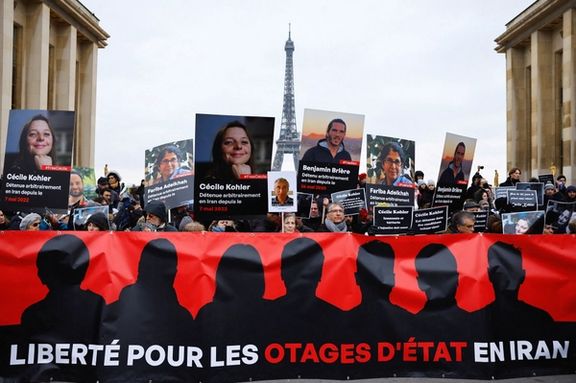
Two French citizens detained in Iran on spurious spying charges have been released and are on their way back to France.
President Emmanuel Macron announced the news on Friday that Bernard Phelan and Benjamin Brière were free, the two men among unknown numbers of diplomatic hostages held by the regime. "We will continue to work towards the return of those of our fellow nationals who are still detained in Iran," Macron said in a tweet.
French Foreign Minister Catherine Colonna spoke to her Iranian counterpart Hossein Amir Abdollahian, a few hours earlier.
Ties between France and Iran have deteriorated in recent months. Tehran had detained seven French nationals in what Paris described as arbitrary arrests equivalent to state hostage-taking.
The statements were released a day after the twitter account of Iran’s embassy in Dublin announced the release of Franco-Irish citizen Bernard Phelan who was earlier sentenced to 6.5 years in prison for "providing information to another country."
Benjamin Brière was sentenced to eight years in prison on spying charges. He had been held in Iran since May 2020, when he was arrested after flying a remote-controlled mini helicopter used to obtain aerial or motion images near the Turkmenistan-Iran border.
Philippe Valent, his France-based lawyer, called the espionage charges against his client a "fiction" and his trial "a parody staged by the Revolutionary Guard".
In the past decade, Iran's Revolutionary Guard have arrested dozens of dual nationals and foreigners, mostly on unproven allegations of espionage and breach of security, in what human rights organizations have said is essentially hostage taking.
Iran has been accused of wrongfully detaining at least a dozen foreign and dual nationals on trumped up charges, effectively as hostages to extract concessions from Western governments. However the full extent of these prisoners is unknown.

Syria owes Iran $50 billion according to leaked documents from Iran’s Foreign Ministry, with fears for Assad’s possible assassination creating fear in Tehran the money may never be recouped.
The revelations came after the hacktivist group ‘Uprising till Overthrow', affiliated with the Albania-based opposition Mujahideen-e Khalq (MEK) group, hacked the Islamic Republic’s Foreign Ministry servers, disabling 210 sites and online services and leaking a large batch of documents.
Minutes from a meeting of Iran’s Supreme National Security Council show Syria’s debt goes back to a long-term agreement signed between the two countries in January 2019, under former president Hassan Rouhani. However, the debt has been building for much longer, with roughly $11bn worth of oil given to Damascus from 2012 to 2021.
A combination of aid in the form of military support and cash, the total amount of debt to Iran is estimated to be about $50 billion, though the document said the final amount is still being calculated.
In the first six months of the Iranian year 1400 (from March 2021 to September 2021), when President Ebrahim Raisi was in office, one million barrels of oil were sent to Syria but the Syrians allegedly demanded two million barrels per month.
The commander-in-chief of Iran’s Revolutionary Guards Hossein Salami proposed a 1.5 million barrel export for the second half of the year upon the suggestion by Esmail Qaani, commander of IRGC’s Quds Force — a division primarily responsible for extraterritorial military and clandestine operations, read the document.
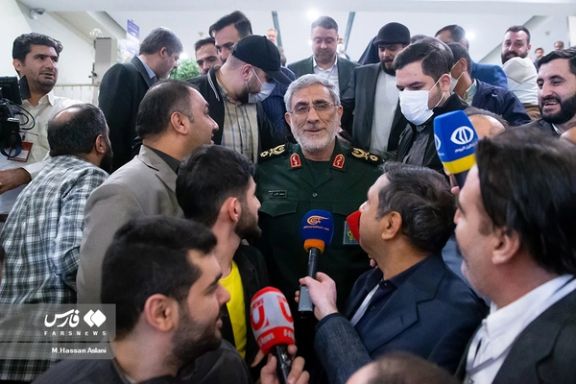
One of the paragraphs of the document referred to Supreme Leader Ali Khamenei’s urgency to cash in on Syria’s debts, fearing a repeat of its investment in Bosnia and Herzegovina.
One of the first Muslim countries to provide support for the Bosnian Muslims in the Bosnian War (1992–95), the IRGC sent more than five thousand tons of arms to the Bosnian Muslims. In spite of massive investment, Tehran's leverage in Bosnia and Herzegovina has decreased significantly, proving a poor asset for the regime.
The document stressed the necessity of having all terms agreed by the two nations’ parliaments to prevent “Iran’s expulsion from Syria under any circumstances” as may happen if Iran’s proxy leader, President Bashar al-Assad, should be assassinated, a concern raised in the documentation.
It stated that the new term of Assad is sensitive and could lead to his elimination, urging that if the document is not finalized soon, "billions of dollars of Iran’s assets will be put in serious danger”. Syria is a key strategic asset for Iran as it wields power through its proxies across the region.
The extent of Iranian military expenditures and financial aid to Syria to keep Assad in power is unknown but is believed to have run into billions of dollars at the expense of the Iranian people.
But Syria is in the midst of a massive regional power-shift, causing concern to Tehran. In the last month, Assad and his aides have met with key figures in countries including the UAE and Turkey as several regional powers see the benefits of bringing Assad, one of Iran's regional puppets, in from the cold, in a bid to lure him away from Tehran’s destabilizing influence.
Last week, Syria was also readmitted to the Arab League after more than a decade in isolation, though Qatar said it would not resume diplomatic ties with Syria until its domestic crisis is resolved.
Iranian parliament member, Heshmatollah Falahatpisheh, announced in May 2020 that the country had invested $30 billion in Syria and must recoup it. With reconstruction costs estimated at $250-$400 billion, Syria urgently needs to improve economic ties with regional countries.
Most recently, Iran has been using the earthquake disaster to smuggle weapons and military equipment into Syria to arm its regional proxies within shipments marked as humanitarian aid.
It is not the first time the ‘Uprising till Overthrow' succeeded in hacking and deactivating several regime websites and services. In June 2022, it hacked over 5,000 security cameras of state bodies and 150 websites belonging to Tehran Municipality, displaying anti-regime slogans on the websites and releasing internal data.
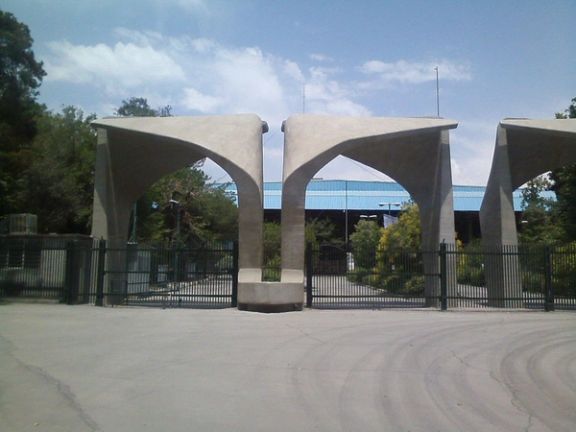
The University of Tehran, the oldest and possibly most prominent Iranian university, has lost its access to databases of scientific articles due to financial problems.
Mehdi Fakour, vice chancellor of research at the university, said Thursday: "Due to the increase in the exchange rate of the dollar in recent months, the total debts of Tehran University have reached 60 billion tomans (600 billion rials or about $1.2 million) since 2018."
He added that subscription fees for several databases in social and behavioral sciences have been paid but the university has not paid its debt to major medical and engineering databases Elsevier and Springer, among the top publishers of peer-reviewed journals in science, humanities and medical fields.
This is not the first time that Iranian universities report such issues. Most Iranian university students suffer months of no access with several short bouts during which they download large numbers of articles and journals to study later.
Earlier in the year, an official of the Iranian Ministry of Science said that a large number of the country's universities have been cut off from access to the world's scientific databases due to the “debts of the universities," noting that sometimes it is impossible to pay the fees because of "sanctions".
Abdossadeh Neisy added that according to the law, contracts between scientific bases and universities are signed in dollars. "Since university budgets in Iran are paid in rials, universities cannot provide the needed budgets,” he said.

Germany has charged a German-Iranian for a regime-backed attempted arson plot on a synagogue in Dortmund.
The federal prosecutor's office announced the verdict against Babak J. on Thursday, saying he was instructed by an intermediary "acting on behalf of unknown Iranian state agencies" in November to carry out the attack.
Following the order, the accused is said to have sought to convince an acquaintance to set fire to the synagogue using a Molotov cocktail.Apparently, the acquaintance had refused.
Later, Babak J.'s handler named another synagogue as a target in the city of Bochum rather than Dortmund, prosecutors said, adding that "the accused refrained from attacking the well-monitored synagogue in Bochum itself for fear of discovery".Instead, he tried to set fire to a school building adjacent to the synagogue.
It is one of a series of foiled attacks in recent months on Jewish sites at the behest of the regime, In March, Israeli intelligence foiled a plot to target a Jewish cultural center in Greece.
Also in March, the Washington Post cited Western intelligence officials as saying that Ramin Yektaparast was the main suspect in organizing an attack in November on a Jewish cultural center in the German city of Essen, allegedly at the behest of Iran’s IRGC.